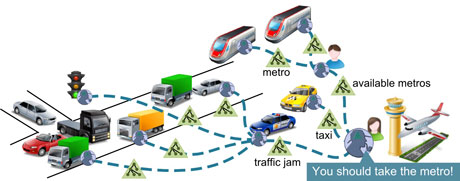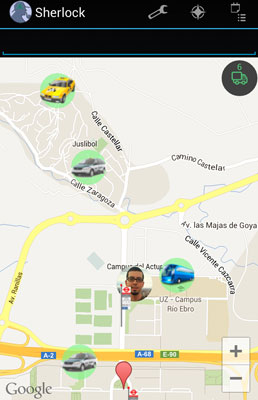by Roberto Yus, Eduardo Mena, Sergio Ilarri and Arantza Illarramendi
Citizens can access a variety of computing services to get information, but it is often difficult to know which service will offer the best information. Researchers in the SHERLOCK (System for Heterogeneous mobilE Requests by Leveraging Ontological and Contextual Knowledge) project, from the University of Zaragoza and the Basque Country University, address this by providing mobile users with interesting Location-Based Services (LBSs).
As Smart Cities become a reality, citizens are starting to be overwhelmed with the amount of data they receive from different sources. This is partly caused by the sheer number of apps they can download to obtain information: most apps are designed for specific scenarios and goals and are embedded with implicit knowledge about the application context. They also receive data almost continuously (e.g., information about pollution, traffic, parking spots, lighting, etc.), which makes it difficult to distinguish which information is valuable. In this scenario, the use of semantic techniques becomes particularly relevant: a system that uses semantic information can help users select the most appropriate and relevant apps to the user's interests and transform the raw received data into smart data that represents actionable information.
Mobile devices (e.g., smartphones and tablets) have become a fundamental part of our everyday lives. According to a report by BI (Business Intelligence), one in five people worldwide owns a smartphone and one in 17 owns a tablet. These devices not only consume information but also create huge volumes of data (e.g., geo-tagged images, videos, text, etc.). In addition, sensors are ubiquitous and a common feature on smart and wearable devices (e.g., activity trackers, smart glasses and watches) as well as city-based sensors (e.g., sensors that measure air pollution, noise and traffic levels). These city-based sensors are useful in the context of Smart Cities. New management approaches are required for all this information to ensure users do not become overwhelmed. The semantic management of data in wireless environments can help users in a variety of ways including assisting with the process of determining what information a user really needs to finding the most appropriate information from a range of different sources and presenting it in an integrated way. For example, imagine tourists who arrive on an evening flight and need to reach their city hotel. At first, it would be useful to infer what kind of information the tourists might need, for example, with regards to transport information they might need to know the different options (e.g., buses, metros, taxis or car rental options), traffic conditions and perhaps even where available parking spaces are located. This information comes from a variety of heterogeneous sources (e.g., websites, city-based sensors, other users and vehicles) and it is difficult to reconcile and present these data as they are needed.


In developing the SHERLOCK [1] system, we sought to provide mobile users with interesting Location-Based Services (LBSs). Begun in 2011, this collaborative project brings together the Distributed Information Systems (SID) group at the University of Zaragoza (Spain) and the Interoperable Database Group (BDI) group at the Basque Country University (Spain). Since we started, we have developed an Android prototype [2] that can be downloaded from the website of the project (see Figure 2 for a screenshot of the app).
Our main focus is to develop a general and flexible system that is able to respond to the information needs of mobile users. We met a number of challenges in this project, but there were three main problems. Firstly, the system has to be able to understand the information needs of the user. For this task, SHERLOCK leverages the user’s context (e.g., location, activity, etc.) that can be extracted for a range of sources, for example, from sensors in his/her mobile device. A personal agent guides the user in the process of selecting an interesting LBS. This agent uses context information along with information about the services, encoded in ontologies (i.e., a formal representation of knowledge) and a semantic reasoner (i.e., a software to infer logical consequences), to deduce which LBSs would be useful for the user. Secondly, the system has to be able to find the information the user needs. For this task, SHERLOCK deploys a network of mobile agents (i.e., software that is able to move from one device to another autonomously) to search all available information among the distributed data sources and bring back the results to his/her device. Finally, the system has to be able to present the results to the user and keep this information updated for as long as the user requires.
We believe that a system such as SHERLOCK is very useful in the context of Smart Cities, as it can support citizens and visitors in achieving their tasks more efficiently and effectively. Any developed city services could easily be made available to SHERLOCK, simply by defining it in the form of an ontology.
Links:
SHERLOCK: http://sid.cps.unizar.es/SHERLOCK
Smartphone and tablet penetration in 2013: http://www.businessinsider.com/smartphone-and-tablet-penetration-2013-10
References:
[1] R. Yus, et al.: “SHERLOCK: Semantic Management of Location-Based Services in Wireless Environments”, Pervasive and Mobile Computing, 2013.
[2] R. Yus, et al.: “SHERLOCK: A System for Location-Based Services in Wireless Environments Using Semantics”, WWW 2013
Please contact:
Roberto Yus
University of Zaragoza, Spain
Tel: +34 976 76 26 50
E-mail:











